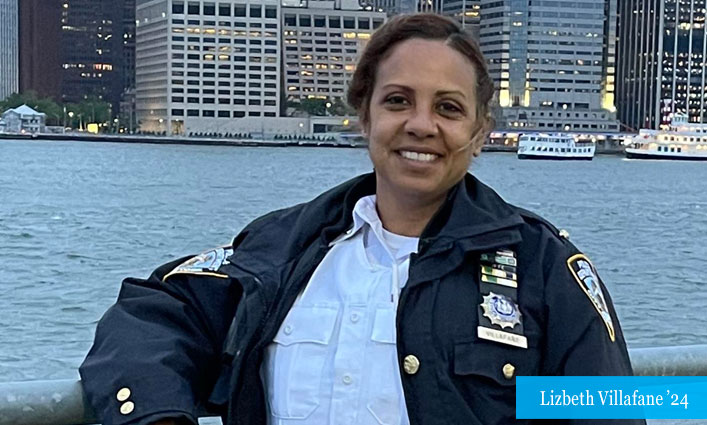
Since its inception, John Jay College has been an institution proud to educate public safety leaders in law enforcement, fire suppression, and emergency medical services. In this article series, we get to know the man or woman “behind the badge” and find out what challenges and inspires them in their jobs.
Lizbeth Villafane ’24, understands the vital role New York City’s 911 system. “I was an officer working with the 40th precinct in the Bronx on September 11th and we were mobilized downtown near the site when the attacks happened,” explains Villafane, a proud Latinx woman and 28 year veteran of the New York City Police Department (NYPD). “At the time there was a lot of unknowns which led to confusion and panic. We didn’t have any communications, the fire department and police radios weren’t working, and the cell phone lines were dead.”
Determined to ensure that New York City’s emergency communications are as effective as possible, Villafane is responsible for securing the Public Safety Answering Center (PSAC) 1, which takes the 911 emergency calls and directs them to first responders. “As commanding officer of the Center, we protect one of the most important infrastructures in our city, the landline between the public and police officers, firefighters, and emergency medical services,” she says. “When you’re calling 911, you’re calling our building. My team ensures that the people working in that building are safe. If they’re not, then that call to 911 and connection to the police officers in the streets isn’t going to happen. I love the work I do and love being in the NYPD. We protect the people of New York.”
What inspired you to want to work in law enforcement?
Since I was five years old, I wanted to become a police officer. My father worked in corrections. So, as a kid, while he was at work, I would put on his uniform and play with his handcuffs, pretending to be in law enforcement. I wasn’t just inspired by my father; I was also inspired by officers in my neighborhood. Growing up, I lived on the Lower East Side and there was always a police car sitting on our block, Avenue D. I remember watching the officers as they were on patrol, and thinking to myself, “I want to do that one day. I want to keep the community safe.”
“I remember watching the officers as they were on patrol, and thinking to myself, ‘I want to do that one day. I want to keep the community safe.’” —Lizbeth Villafane ’24
Tell us about your experience in John Jay’s NYPD Leadership Program.
I always wanted to finish my graduate degree. I remember taking the police leadership courses and it opened my eyes to what the word “leadership” truly means. I was a sergeant at the time and a supervisor, but being a supervisor and being a leader are two very different things. Because it’s not just about giving someone their assignment and posting them somewhere, it’s about learning different leadership styles. Leadership is an ongoing growth process. You’re learning to look at yourself and say, “I can improve,” or “Maybe that wasn’t the appropriate response, and I should apologize.” It really changed my life. I encourage other officers to go to John Jay and enroll in the program. It will make a difference in your life.
Can you describe your best day on the job?
A young man from the Hispanic community was interested in becoming a cop, but he was unsure. I talked to him and told him about all the great things being in the NYPD offered and then suggested he go to the Citizen Police Academy. I told him, “This is the stepping stone, see if you like it and if not, well, then you do something else.” This July will mark 10 years that he’s been a police officer. It’s one of my proudest moments in the NYPD.
What is the Citizens Police Academy?
The Citizen Police Academy is an amazing six-week program that gives members of the public a deeper understanding of NYPD procedures, the laws, and background of our department. You learn about everything from dealing with emotionally disturbed persons, policies that are in place, to why some folks get arrested and others don’t. A lot of people who go through the academy come out saying, “Oh, now I know why NYPD does things this way.”
What do you think needs to happen to keep our community safe?
Communication is key. The truth is law enforcement can’t do it alone. The public has to be involved in the process. I know sometimes people don’t want to get involved because they’re afraid, but for us to figure things out we need to have information and understand the community’s needs. One of the easiest ways of getting involved is by joining a community-based organization or different NYPD programs, like the Citizen Police Academy, and bring that information you learn back to the community.



